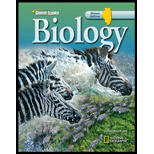
Concept explainers
Introduction:
A cell grows until it reaches its size limit, then it either stops growing or divides. Most cells undergo division. Cell division helps a cell to reproduce and makes the organism grow and heal certain injuries.
Answer to Problem 3STP
Correct answer :
The correct answer is option D. mitosis
Explanation of Solution
Explanation/justification for the correct answer:
Option D.Mitosis- The second stage in a cell cycle is mitosis in which cell’s nucleus and nuclear material divides. In this stage the cell’s replicated genetic material separates and the cell prepares to split into two cells. There are four stages in mitosis; prophase, metaphase, anaphase and telophase.
Prophase- This is the first stage in which nuclear membrane disintegrates, nucleolus disappears, chromosomes condense and mitotic spindle begins to form between the poles of the cell.
Metaphase- In this stage the chromosomes attach to mitotic spindle and align along the equator of the cell.
Anaphase- In this stage, the microtubules shorten, moving the chromosomes to opposite poles.
Telophase- This is the last stage in which the chromosomes reach the poles of the cell, nuclear envelope forms again, nucleolus reappears and chromosomes decondense.
Explanation for incorrect answer:
Option A. cell cycle- Cells reproduce by a cycle of growing and dividing called the cell cycle.There are three main stages of a cell cycle; interphase, mitosis and cytokinesis. The entire sequence of events in the life of a eukaryotic cell is called cell cycle. Hence this is not the correct option.
Option B. cytokinesis-The last stage of cell cycle is cytokinesis in which the cytoplasm of the cell divided creating a new cell. The nuclear material and nucleus does not divide in this stage. Hence this is not the correct option.
Option C. interphase- A cell spends most of the time in interphase. It is the stage in which a cell grows, carries out cellular activities and
Chapter 10 Solutions
Biology Illinois Edition (Glencoe Science)
Additional Science Textbook Solutions
Anatomy & Physiology
Concepts of Genetics (12th Edition)
Anatomy & Physiology (6th Edition)
Human Biology: Concepts and Current Issues
Campbell Essential Biology with Physiology (6th Edition)
Biology: Life on Earth (11th Edition)
 Human Anatomy & Physiology (11th Edition)BiologyISBN:9780134580999Author:Elaine N. Marieb, Katja N. HoehnPublisher:PEARSON
Human Anatomy & Physiology (11th Edition)BiologyISBN:9780134580999Author:Elaine N. Marieb, Katja N. HoehnPublisher:PEARSON Biology 2eBiologyISBN:9781947172517Author:Matthew Douglas, Jung Choi, Mary Ann ClarkPublisher:OpenStax
Biology 2eBiologyISBN:9781947172517Author:Matthew Douglas, Jung Choi, Mary Ann ClarkPublisher:OpenStax Anatomy & PhysiologyBiologyISBN:9781259398629Author:McKinley, Michael P., O'loughlin, Valerie Dean, Bidle, Theresa StouterPublisher:Mcgraw Hill Education,
Anatomy & PhysiologyBiologyISBN:9781259398629Author:McKinley, Michael P., O'loughlin, Valerie Dean, Bidle, Theresa StouterPublisher:Mcgraw Hill Education, Molecular Biology of the Cell (Sixth Edition)BiologyISBN:9780815344322Author:Bruce Alberts, Alexander D. Johnson, Julian Lewis, David Morgan, Martin Raff, Keith Roberts, Peter WalterPublisher:W. W. Norton & Company
Molecular Biology of the Cell (Sixth Edition)BiologyISBN:9780815344322Author:Bruce Alberts, Alexander D. Johnson, Julian Lewis, David Morgan, Martin Raff, Keith Roberts, Peter WalterPublisher:W. W. Norton & Company Laboratory Manual For Human Anatomy & PhysiologyBiologyISBN:9781260159363Author:Martin, Terry R., Prentice-craver, CynthiaPublisher:McGraw-Hill Publishing Co.
Laboratory Manual For Human Anatomy & PhysiologyBiologyISBN:9781260159363Author:Martin, Terry R., Prentice-craver, CynthiaPublisher:McGraw-Hill Publishing Co. Inquiry Into Life (16th Edition)BiologyISBN:9781260231700Author:Sylvia S. Mader, Michael WindelspechtPublisher:McGraw Hill Education
Inquiry Into Life (16th Edition)BiologyISBN:9781260231700Author:Sylvia S. Mader, Michael WindelspechtPublisher:McGraw Hill Education





